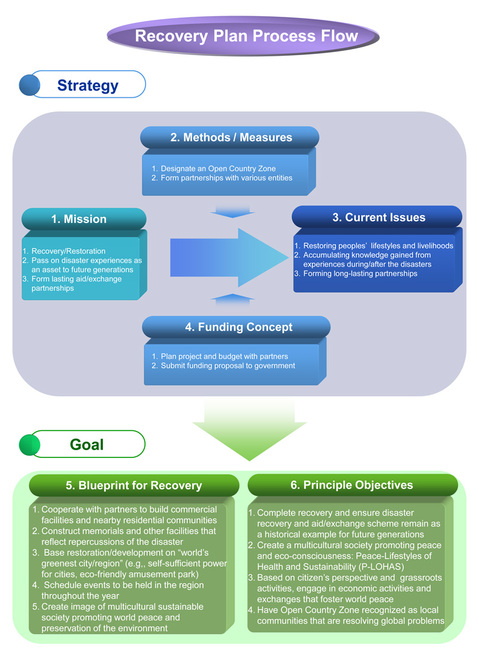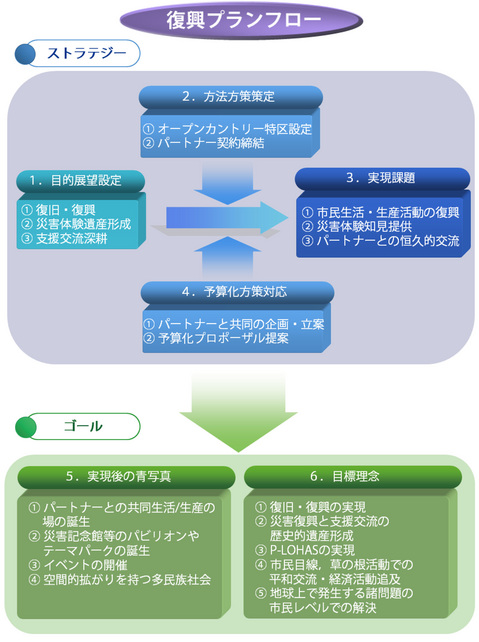On behalf of the Tsukuba Society for Innovation, I would first like to begin by offering sincere condolences to the people affected by the Great East Japan Earthquake on March 11, 2011, and the ensuing disasters that followed in its aftermath. It is our hope that relief activities continue at an unprecedented pace, leading to swift regional recovery and returning areas damaged by the disasters into safe, healthy sustainable communities where residents live prosperously while maintaining a harmonious balance with the environment.
< Proposal Overview >

March 10, 2012
Tomoki Kinoshita
Chairman, Tsukuba Society for Innovation
Professor, Tsukuba Gakuin University
Haruka Matsuoka Ph.D.
Vice Chairman, Tsukuba Society for Innovation
Assistant Professor, Tsukuba Gakuin University
Thomas L. Gerrard
Member, Tsukuba Society for Innovation
President, Communication Professionals Co., Ltd.
< Proposal Overview >
- Mission
- The mission of this project is to promote quick recovery of the disaster-stricken areas in the Tohoku region of Japan. In relation to this, it's necessary to pass on the experiences and lessons learned during the threefold catastrophe (earthquake, tsunami, nuclear power plant incident), as this will be a valuable cultural asset for future generations. Importantly, this should include detailed information on the rescue and relief aid activities conducted by individuals, companies, organizations, and local and national governments; both domestic and international.
- Methods / Measures
- Designate the disaster-stricken areas in the Tohoku region as the "Open Country Zone": a special administrative zone where restoration and development are openly promoted in a borderless setting. In this zone, domestic and international companies, organizations and governments will be free to form partnerships with companies, groups, organizations and/or governments of designated cities/ prefectures for the purpose of conducting restoration and development work.
- Current Issues
- Restoring peoples' lifestyles and livelihoods (e.g., manufacturing, farming, fishing)
- Accumulating the knowledge gained from experiences during/after the disasters, and preparing and preserving it so that it can be told to future generations
- Forming long-lasting partnerships
- Funding Concept
- Funding of the basic infrastructure for each project is to be borne by the Japanese government. Companies, organizations and governments in applicable cities/regions shall search out their desired partner(s), work with them to draft plans and resolve related issues, and then submit the restoration/development proposal and budget to the Japanese government. In short, the concept is to create a domestic version of the Japan International Cooperation Agency (JICA).
- Blueprint for Recovery
- The following activities are suggested to be used as a catalyst for planning restoration and development projects.
- Cooperate with partners to build commercial facilities (e.g., factories, plants, agricultural/fish farms) and nearby residential communities to house employees.
- Construct memorials (e.g., public squares with statues/commemorative plaques, historical museums) that reflect the repercussions of the disasters, creating places where local people can gather to converse and interact, and visitors can come to learn about the region's history before and after.
- Base restoration and development on "the world's greenest city/region" using clean energy/fuel-cell power plants, transportation, etc. Possible project concepts include building fuel-cell power plants that produce electricity for a city, making it self-sufficient, and selling unused capacity to fund municipal projects; and constructing the world's most eco-friendly amusement park.
- Produce annual schedules for traditional festivals/events held throughout the disaster-stricken region, as well as for events/conferences/seminars to be held at newly constructed memorials. Ensure schedules are created so that there is always at least one event/festival being promoted within the Open Country Zone.
- For the region as a whole, create the image of a multicultural sustainable society that proactively promotes world peace and preservation of the environment.
- Principle Objectives
- Complete recovery, and ensure that the disaster recovery and aid/exchange scheme implemented remain as a permanent historical example for future generations.
- Endeavour to make the Open Country Zone a multicultural sustainable society that emphasizes peace and eco-consciousness (Peace-Lifestyles of Health and Sustainability (P-LOHAS)).
- Based on the perspectives of its citizens and in partnership with the United Nations headquarters in New York, USA, the Tohoku Open Country Zone shall engage in economic activities and exchanges that foster world peace.
- While empowering people with the ability to solve global problems at the local level, it is hoped that the Open Country Zone will become a microcosm for the globe, representing a society whose primary considerations are its citizens and the land.

March 10, 2012
Tomoki Kinoshita
Chairman, Tsukuba Society for Innovation
Professor, Tsukuba Gakuin University
Haruka Matsuoka Ph.D.
Vice Chairman, Tsukuba Society for Innovation
Assistant Professor, Tsukuba Gakuin University
Thomas L. Gerrard
Member, Tsukuba Society for Innovation
President, Communication Professionals Co., Ltd.

